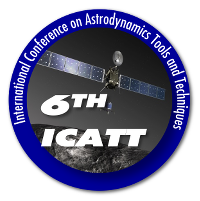Speaker
Dr
Pierluigi Di Lizia
(Politecnico di Milano)
Description
The problem of uncertainty propagation represents a crucial issue in spaceflight dynamics since all practical systems - from vehicle navigation to orbit determination or target tracking - involve nonlinearities of one kind or another. One topic of recent interest concerns for instance, the space surveillance and the accurate propagation of uncertainties on the initial conditions of resident space objects in order to identify and track them. Another relevant application consists of computing landing dispersion both for reentry missions and for estimating the casualty area of space debris.
In addition, within the space mission design process, uncertainty propagation is a fundamental tool to assess the fulfillment of mission requirements and constraints, to evaluate mission performances, to perform sensitivity analyses, and to verify the robustness of guidance and control laws. However, most spaceflight mechanics problems involve nonlinearities. This observation finds proof even in basic applications. For instance, many problems in celestial mechanics require conversions between different coordinate systems (e.g. the conversion from polar to Cartesian coordinates that form
the foundation for the observation models of many sensors). Such transformations are typically nonlinear and therefore entail the problem of applying nonlinear transformations to the estimated statistics.
Although in the recent past, the power of computing hardware has been growing exponentially, giving rise to many new possibilities in the field of numerical mathematics, the vast majority of numerical algorithms developed to tackle the problem of uncertainty propagation, are still largely based on the same pointwise or linear algebra (matrix) techniques developed 50-100 years ago.
In particular, two main families of techniques exist: the first one is represented by standard linear methods, where a linear approximation is introduced and used to perform uncertainty analyses. Despite the advantages in terms of computational time, they are typically characterized by a low level of accuracy, since the linear approximation holds only in a restricted region of the problem domain. The second one is represented by standard Monte Carlo techniques, which are able to provide very accurate results, but require large computational times and memory burden. In light of the above, the scientific community has started focusing on the development of new tools, able to improve the approximation of standard linear methods available in the literature or to reduce the computational time required by standard Monte-Carlo simulations.
Differential algebra (DA) perfectly suits with these requirements, providing a method to easily extend the linearization methods and allowing the implementation of efficient arbitrary order methods. The resulting technique performs much faster and yields more accurate results in many mathematical, physical as well as engineering applications.
Dinamica, with the support of ESA, has recently completed the implementation of the Differential Algebra Space Toolbox (DAST), a DA-based software tool for the efficient, nonlinear propagation of uncertainties in space dynamics. DAST is divided in three main layers: the Differential Algebra Computational Engine (DACE), the Software Framework (SF), and the Uncertainty Propagation Tool (UPT). DACE provides the user with the tools to perform all the basic DA operations by replacing the operations between single numbers by suitably chosen operations on polynomials. The same sequence of operations coded for floating point numbers can thusly be evaluated using this new meaning of each operator almost without changes to the code. SF is built on DACE and comes with a set of more advanced features (e.g. vectors and matrices of DA, propagation schemes), specific astrodynamic routines (DA Kepler solver and DA Lambert solver) and ready-to-use dynamical models. Finally, UPT allows the user to propagate uncertainties through different
techniques (from classical Monte Carlo to range estimation using polynomial bounders or classical linear covariance propagation) and perform statistical analyses.
Although the general mathematical foundation suggests potential applications of the same approach to various fields such as biology, automotive engineering, and finance, this work focuses on the application of DAST to a set of different test cases in the field of astrodynamics and space engineering, with the aim to illustrate the potentials with respect to classical approaches. Thanks to the use of DA techniques, indeed, DAST has been shown to be orders of magnitude more efficient than traditional methods for uncertainty propagation.
| Applicant type | First author |
|---|
Primary author
Mr
Mirco Rasotto
(Dinamica Srl)
Co-authors
Dr
Alessandro Morselli
(ESA/ESOC)
Dr
Alexander Wittig
(ESA Advanced Concepts Team)
Ms
Celia Yabar
(Moltek for ESA)
Dr
Guillermo Ortega
(ESA)
Dr
Mauro Massari
(Politecnico di Milano)
Dr
Pierluigi Di Lizia
(Politecnico di Milano)
Dr
Roberto Armellin
(Universidad de La Rioja)

